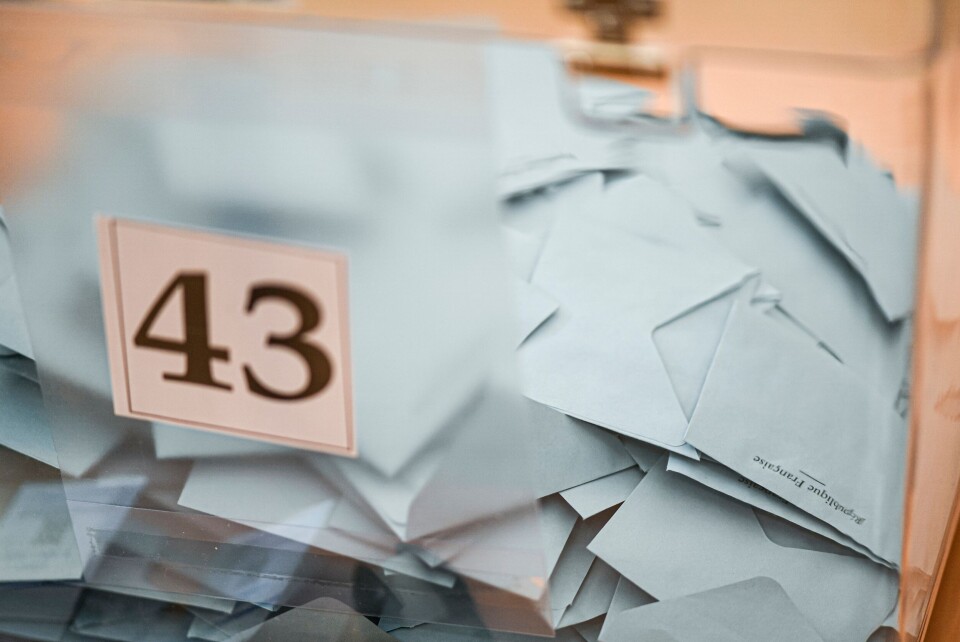-
Hosting scheme in south-west France lets newcomers sample lifestyle
Households in nine Dordogne communes volunteer under Mes Nouveaux Voisins scheme
-
French boulangeries demand right for staff to work on May 1 so they can open
Artisan bakery owners can work but employees cannot, while certain industrial bakeries are allowed to remain open with workers
-
How many Americans live in Paris - and where else are they choosing in France?
Over a quarter of all US nationals in France live in the capital city
French election: What is a ‘vote blanc’ and does it achieve anything?
Four million people submitted a ‘vote blanc’ or an invalid vote in the second round of the presidential election in 2017

In France, a person enters a ‘vote blanc’ (blank vote) at a polling station if they want to show a desire to vote but not for any of the available candidates – or options in the case of a referendum.
Someone submitting a vote blanc would normally slip an empty envelope into the ballot box.
It is different from an abstention when someone does not go to the polls – and a ‘vote nul’ (invalid vote), which denotes a vote which cannot be included in the result as it is torn, annotated or otherwise ‘spoiled’.
Votes nuls often contain messages written by the elector in advance, which have been dropped into the ballot box in the place of the correct paper.
The votes blancs and votes nuls submitted during an election are counted and made public but are not considered to be legitimate votes.
Therefore, such votes do not carry any more weight than abstentions.
However, their number is significant: in 2017, 11.5% of electors – or four million people – submitted a vote blanc or vote nul in the second round of the presidential election, while 9.9% of voters did so for the legislative elections later that year.
Jérémie Moualek, senior lecturer at the Université d’Evry and a specialist in votes blancs and nuls has a Twitter account dedicated to this form of voterly expression.
“Blank and spoiled ballots have been made completely invisible, so I wanted to show how this electoral behaviour manifests itself, how it takes diverse forms,” he told Le Monde.
“It is an option which is constantly instrumentalised in politics, without ever being seriously examined.”
What do presidential candidates think of votes blancs?
Half of the candidates in the first round of this year’s presidential elections – including Nicolas Dupont-Aignan (Debout La France), Nathalie Arthaud (Lutte Ouvrière) and Jean-Luc Mélenchon (La France Insoumise) have said that they are in favour of counting blank ballots as valid votes.
The stance of candidates such as Eric Zemmour (Reconquête), Valérie Pécresse (Les Républicains) and Marine Le Pen (Rassemblement national) remains unclear.
Emmanuel Macron (La République en Marche) dismissed the idea when it was proposed by the gilets jaunes protesters in 2019, but had previously said he was open to it.
What would happen if votes blancs were classed as valid votes?
A campaign called ‘Faire gagner la démocratie’ (Make democracy win), led by the Démocratie ouverte collective, has called for blank ballots to be made available as one of the options in polling stations, and for these votes to be counted in the final result.
If a majority of voters returned a blank vote, the election would be declared null and void and new candidates would have to stand. Some commentators say this would only have a significant effect if the vote was made obligatory in France.
“Currently considered to be useless, blank votes could be utilised much more to express a defiance towards or a rejection of the political offering if it could oblige [the state] to reorganise an election,” said Armel Le Coz, cofounder of Démocratie ouverte.
Taking votes blancs into account would also give results which reflected the electorate’s wishes more faithfully.
For example, if all of the votes blancs and votes nuls had been included in the 2017 result, Mr Macron’s majority would have been smaller, at 58.5% of the vote rather than 66.1%, and Ms Le Pen’s share would have fallen from 33.9% to 30%.
Blank votes are already classed as valid votes in countries such as the Netherlands and Spain, although not for legislative elections.
Related articles
Macron vs Le Pen: six key points from the TV French election debate
Jean-Luc Mélenchon calls on France to elect him as prime minister
EU, health: How have Macron and Le Pen’s policies changed since 2017?
























